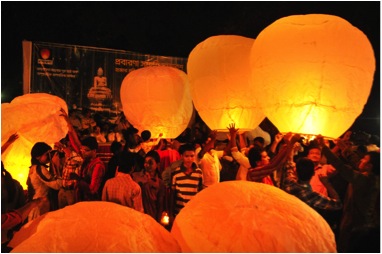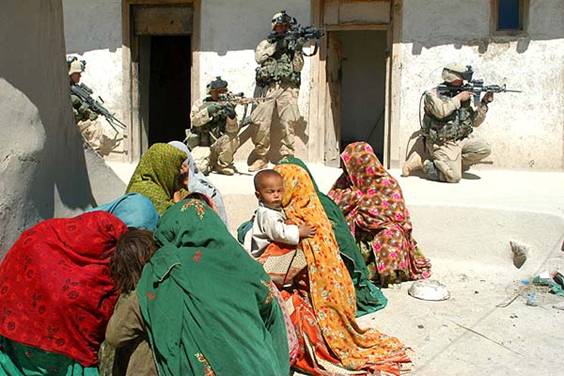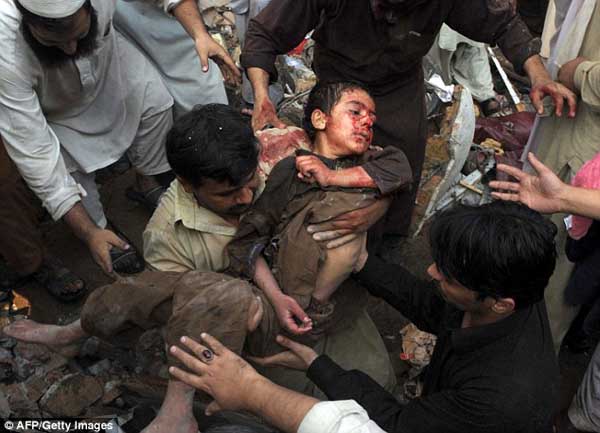
By Rahnuma Ahmed
We Jews should never, ever become like our tormentors — not even to save our lives. Even at Auschwitz, I sensed that such a moral downfall would render my survival meaningless.
— Hajo Meyer, An Ethical Tradition Betrayed. Huffington Post, January 27, 2010.
If it had been Daniel Pipes, an Islamophobic American columnist, I wouldn’t have bothered. According to him, Karl Marx and Friedrich Engels too, are anti-Semitic.
But these were close friends of Shahidul, both are Jewish, both are gentle, thoughtful and intelligent people who had read my columns posted on his blog, had written to say that they were deeply upset at my “anti-Semitism.” One of them, as she explained in her letter to me, had demonstrated with Palestinians against recent Israeli attacks on Gaza. Against earlier attacks too, the ones in Lebanon. She was no lover of Zionism, definitely not of Mossad, she wrote. The other, a much older friend of Shahidul’s, said that he wholeheartedly supported the existence of a Jewish state, and a Palestinian state in it’s own right. But what I write on Israel and Palestine is `nonsense,’ the sort of stuff that a fine scholar like myself shouldn’t be writing.
What does one do in such a situation? Besides feeling deeply upset, of course.
Read what one has written through their eyes. Turn one’s ideas this way and that. Look underneath. Reflect.
For today’s column I had thought of writing about what has led careful observers to not only think that 9/11 was an inside job but, that Israel and Mossad are connected to 9/11. Regular readers may remember that I have directly, or indirectly, written about 9/11, in many of my previous pieces. `Conspiracy theories.’ Learning from 9/11 (April 13, 2009). Al-Qaeda and Western intelligence operations (April 27, 2009). The Unfolding Crisis in Pakistan, parts 1 – 4 (May 11, 17, 18, 19 2009). The West’s immortal terrorist (December 21, 2009). 9/11 suicide hijackers. Risen from the dead (December 28, 2009). Pentagon’s prayers (January 4, 2010). Padded underwear (January 11, 2010). Mirror, mirror on the wall. Who provides the best security of them all? (January 25, 2010).
Regular readers also know that I analyse and critique not only western powers, but also, dominant institutions and ideologies, at home. That some of my recent pieces had discussed how Bengalis are prone to portray themselves as `victims’ rather than perpetrators of violence and injustice in the Chittagong Hill Tracts (April 5, 2010). How nationalist narratives of Bangladesh, whether celebrating the language movement of 1952 or the liberation struggle of 1971, have always been ethnically `singular’ (March 8, 2010). How Bengalis have begun mimicking their erstwhile Pakistani rulers when it comes to explaining what has gone wrong in the CHT: they have blamed it on others. How Bengali/national imagination needs to be de-colonised (March 26, 2010). Those who’ve read what I’ve written in Bangla know of my edited and translated collection of interviews and writings by contemporary Muslim intellectuals who engage with questions that are considered to be socially taboo in Bangladesh: do Muslims need to re-imagine Allah in a manner appropriate to the 21st century? Should the state intervene (and govern) the relationship between Allah, and His believer, since in Islam, Allah is sovereign? Are hadis and shariah patriarchal? Since homosexuality is real, and homosexuals are discriminated against by the Belgian government, shouldn’t Belgian Muslims who’ve also been victims of government discrimination, extend their support to homosexuals? (Islami Chintar Punorpothon: Shomokaleen Musolman Buddhijibder Shongram, 2006).
Nothing short of wild horses would have driven me to make this list but I do so to pre-empt attempts to deflect criticism of Israel and Zionism, usually conducted by raising counter-questions: But what about the oppressions and injustices in your own society? Why don’t you write about those?
I do.
And when I do, I don’t try to `balance’ my account of atrocities committed in the name of Bengalis in the CHT (can atrocities ever be balanced?). On the contrary, as a Bengali, I think it is obligatory that I write in the strongest possible terms, and what better day than our independence day to pen lines such as these:
“Thirty-eight years on and I look at myself. I look at us women. I look at our normal, peacetime lives. And I wonder, if justice had been done, if the war criminals had been tried, if women had returned to their families, to their parents, husbands, lovers, brothers, if they did not have to go Pakistan, or to brothels, or to Mother Teresa’s in Kolkata, if those pregnant could have had their babies if they had wished, would my life, would our lives have been differently normal? If justice had been done, would the rape of hill women have been a necessary part of the military occupation of the Chittagong Hill Tracts? Would the offenders have enjoyed impunity? Would there not have been independent judicial investigations? Would those guilty have gone unpunished? Would the Chittagong Hill Tracts have been militarily occupied at all?” (Distances, Independence day supplement, New Age, March 26, 2008).
As the writers of When Victims Rule: A Critique of Jewish Pre-eminence in America argue, `Injustices perpetrated by the powerful, whoever they are, must always be challenged.’
Exactly. No balancing acts please. Like Yael Kahn, a courageous Jewish activist, who termed the recent JCall petition of 3,000 European Jews to the European Parliament as being “wholly inappropriate” to what the present demands. The petition had said that the systematic support of Israeli government policy is dangerous. That the Israeli occupation and settlements are morally and politically wrong. That Israel is going down the wrong path. That the current Israeli policies are a source of injustice for the Palestinians. Kahn welcomed the petititon but blasted JCall for failing to mention Israel’s barbaric seige of 1.5 million Palestinians living in Gaza. Neither do the petitioners speak out against Israeli restrictions on the amount of food Gaza’s Palestinians are allowed to have. Every person of conscience, she said, must take action to lift Israel’s seige of Gaza (al-Jazeera, May 4 2010).
And to this I’d like to add, why is it that these actions of the Israeli government are not considered to be anti-Semitic? As Curt Day points out, there are three dictionary definitions of Semite and one of these includes those living in Southwest Asia . In other words, Arabs. If Semites include Arabs, then is not this restricted use of the term anti-Semitism “racist”?
And maybe that is part of the problem. The assumption of an essential anti-Semitism. Fixed. Unchanging. Outside history. Regardless of what Jews do. Even if they become oppressors. Even when they become oppressors, so intent on oppressing that they become forgetful of which lessons to learn from history. For instance, this Israeli officer:
“In order to prepare properly for the next campaign, one of the Israeli officers in the (occupied) territories said not long ago, it’s justified and in fact essential to learn from every possible source. If the mission will be to seize a densely populated refugee camp, or take over the casbah in Nablus, and if the commander’s obligation is to try to execute the mission without casualties on either side, then we must first analyze and internalize the lessons of earlier battles?even, however shocking it may sound, even how the German army fought in the Warsaw ghetto.”
Amir Oren, military correspondent, Haaretz, had added: If this officer believes that the casbah of Nablus resembles the Warsaw ghetto, who, in his mind, resemble the officers of the Israeli army?
But then, as Auschwitz survivor Hajo Meyer tells us, Auschwitz and the Holocaust have been elevated into a new religion in Israel. “In the beginning is Auschwitz,” as Elie Wiesel had said. “Nothing should be compared to the Holocaust but everything must be related to it.” It is this that has allowed one of the worst genocides in history to be “exploited for political ends.” When Holocaust was turned into a religion it came to mean that Israel can do no wrong.
And I would like to add, Israel’s wrongs are not only confined to the occupied territories/ Palestine, but extends to Afghanistan and Iraq. To Pakistan. It reaches out to Iran, too.
Had the situation been the opposite, I would have been as vocal in defence of what would then have been the Israeli cause.
An earlier version published in New Age
Concluding instalment, next week
Earlier version published in New Age Monday May 10, 2010








